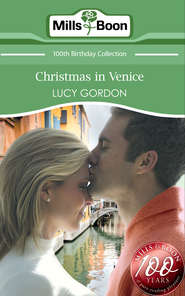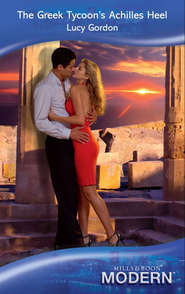По всем вопросам обращайтесь на: info@litportal.ru
(©) 2003-2025.
✖
Swept Away!: Accidentally Expecting! / Salzano's Captive Bride / Hawaiian Sunset, Dream Proposal
Автор
Год написания книги
2019
Настройки чтения
Размер шрифта
Высота строк
Поля
Dante, of course, had to be original, hopping behind her from tree to tree as she walked through the garden, darting out of sight when she turned until she cried, exasperated, ‘Come out, you idiot.’
‘If you’re calling me an idiot, does that mean I’m forgiven?’ he asked, presenting himself hopefully before her.
‘I guess it does.’
From behind him came a shout. ‘Dante, are you coming?’
‘On my way,’ he yelled back. ‘I’m going into town with Carlo and Ruggiero, but I couldn’t go until I knew I was back in favour.’
‘I didn’t say you were back in favour,’ she told him sternly. ‘I said you were forgiven—just.’
‘Yes, of course, there’s a difference. I’ll work on it when I get back. Bye.’
He kissed her cheek and fled, leaving her laughing and wondering what she had to do to get the last word.
But then, she reflected, did she really want the last word? It had a melancholy sound.
She spent an enjoyable day with Hope and the other women, talking about England and fussing over the children. Dante’s behaviour to her that evening was restrained and impeccable. He seemed completely oblivious to her as a woman, which was how she preferred it, she tried to tell herself.
Ferne had said she was never without her camera, and it was true, so when she came across Toni playing with Ruggiero’s baby son she hurried into action and produced some swift, spontaneous shots that had everyone exclaiming with delight.
‘I’ve been thinking what I can do to thank you for your kindness,’ Ferne said to Hope. ‘And now I know. I’m going to take pictures, dozens of them—everybody alone, in couples, with their children, without their children. Then I want you all to gather in the garden so that I can take a big one.’
‘And I’ll always have a memento,’ Hope cried, overjoyed. ‘Oh, yes please.’
Ferne started at once, going around the house, working on her idea until everyone had a solo shot, down to the tiniest child.
To these she added pictures taken secretly, when people had been unaware of being photographed and were therefore more natural. The final result was a triumphant collection that made Hope weep with joy, and give a special dinner in Ferne’s honour.
‘That was a very kind thing you did,’ Dante said as they sipped wine together. ‘Hope’s family is everything to her.’
His praise made her slightly embarrassed.
‘I did it for myself, really. Taking pictures is a kind of compulsion, and when I can’t do it I get restless.’
‘Why do you put yourself down? Who are you hiding from?’
‘Since when were you an expert in psychoanalysis?’ she asked, amused. ‘I’m not hiding.’
‘Some people would say you were hiding behind the camera, getting everyone else into focus but staying safely concealed. I’m just playing with ideas. If you want some good pictures, let me take you into town and show you old Naples, where the historic buildings still exist. You’ll find all the pictures you want.’
She agreed eagerly and they went the next day, driving down into the centro storico, as historic Naples was called. As he’d guessed, she was enthusiastic and began clicking, enchanted by the narrow, winding streets with washing strung from side to side, and the stalls selling fish and fruit.
At last they collapsed into chairs at a roadside café, and revived themselves on cake and coffee.
‘I’m so glad you thought of this,’ she sighed blissfully. ‘It’s been wonderful. This place is almost too picturesque to be true.’
Dante nodded. ‘Naples has its modern districts, places full of soulless, efficient buildings. But it also has these corners where people can still be human instead of cogs in a wheel. People here don’t just know each other, they’re neighbours, practically family. A lot of them are family. You tend to get whole apartment-blocks populated by relatives. Let’s have some—’
He stopped as a wild scream came from somewhere nearby. Suddenly there was chaos. People were running down the little streets, waving their arms and indicating something behind them.
‘Incendio!’ they screamed. ‘Incendio!’
‘There’s a fire somewhere,’ Dante said.
Following the pointing hands, they began to run until they came to a five-storey building on one side of a narrow alley, where the ground was entirely made of steps. Smoke was billowing from the windows and people were streaming out, shouting to each other.
‘They’ve called the fire brigade,’ Dante said, picking up a few words. ‘But these lanes are too narrow for the machines. The nearest they’ll get is that corner, then they’ll have to carry the ladders into this street and set them on the ground. Let’s hope their ladders are long enough. Luckily, everyone seems to be escaping the buildings fast.’
Behind them a woman was screaming, ‘Piero, Marco, Ginetta, Enrico—mio dio!’
From the bags cast aside on the pavement, it seemed that she had been shopping when the news had reached her and had run back to her children. Now they were hurling themselves into her arms and she was sending up frantic prayers of relief.
‘Salvo,’ she wept. Safe. ‘Oh, dio! Salvo. Ma no! Dove Nico?’
Nico? People began to look around. Nico? Where was Nico?
One of the boys said something and recoiled as his mother slapped his cheek.
‘What is it?’ Ferne asked, horrified.
‘Nico was coming down with them, but they lost sight of him,’ Dante explained. ‘She’s blaming them for going on without him.’
‘Nico!’ the woman screamed, gazing up at the building. ‘Nico!’
Suddenly there was a mighty rumble followed by a crash from inside the building, and smoke billowed out of the windows.
‘The inside has collapsed,’ Dante said grimly. ‘Let’s hope Nico got out.’
But the next moment there was a shout of horror. Everyone looked up to see a little boy standing on a rickety wrought-iron balcony at the top, looking down.
‘Nico!’ his mother screamed again. ‘Come down.’
She was too hysterical to realise that this was impossible, but everyone else understood, and groans went up at what seemed inevitable.
People were running to fetch ladders which they leaned up against the wall, but the boy was five storeys up and nothing reached him. Another ominous rumble from within the building warned how close danger was.
‘Move that ladder!’ Dante yelled. ‘Push it over here.’
‘But it’s not long enough,’ someone protested.
‘Don’t argue,’ he roared. ‘Just do as I say.’
Impatiently he yanked the ladder from their hands and set it up against the wall.
‘Hold it,’ he snapped.
Recognising the voice of authority, they scurried to obey. This was a new Dante, one Ferne had never seen before, a man of grim determination; his eyes were hard, his attitude set, brooking no argument, and woe betide anyone who got in his way.











